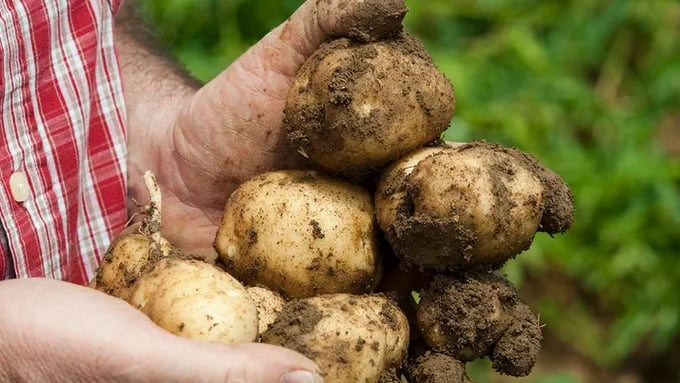November 28, 2025 | 04:16 GMT +7
November 28, 2025 | 04:16 GMT +7
Hotline: 0913.378.918
November 28, 2025 | 04:16 GMT +7
Hotline: 0913.378.918

Freshly harvested potatoes are shown covered in soil. Plain boiled potatoes were not associated with a higher risk of diabetes, according to a new study.
A new study shares some sympathy for a much-maligned vegetable: the potato.
It found that the way the potato is prepared — including what people add to it — is what's associated with Type 2 diabetes, rather than the "humble" vegetable itself.
The study was published in Diabetes Care, a peer-reviewed journal by the American Diabetes Association for health care providers.
Previous research had shown an association between diabetes and total potato intake.
A team of Australian researchers, led by Dr. Nicola Bondonno from Edith Cowan University’s Nutrition and Health Innovation Research Institute, explored the relationship of vegetable intake and the incidence of Type 2 diabetes.
The researchers also examined the relationship of potato consumption and the incidence of Type 2 diabetes.
Over 54,000 participants, ages 50-64, were recruited from the Danish Diet, Cancer and Health cohort, which examined the relationship between dietary components and the incidence of cancer and other chronic diseases.
The participants filled out a 192-item "food frequency questionnaire" at the start of the study.
Those who took part noted how often they ate a particular food for the past 12 months, said co-author Pratik Pokharel, a PhD candidate who worked on the analysis for the paper.
"The intake of foods and nutrients were then estimated using standard recipes and the software FoodCalc," Pokharel told Fox News Digital.
Eating more vegetables may equal a lower risk of diabetes
The researchers found that those with the highest total vegetable intake had a 21% lower risk of developing Type 2 diabetes — compared to the group with the lowest intake of vegetables, after adjusting for lifestyle and demographic confounding variables.
They also found that participants with the highest potato consumption had a 9% higher risk of Type 2 diabetes, compared to the group who ate the lowest daily amount.
Boiled potatoes are key
"When we separated boiled potatoes from mashed potatoes, fries or crisps, boiled potatoes were no longer associated with a higher risk of diabetes. They had a null effect," Pokharel said in a press release.
The study found that those who ate the most potatoes also consumed more butter, red meat and soft drinks, which are known to increase the risk of Type 2 diabetes.
"When you account for that, boiled potatoes are no longer associated with diabetes," added Pokharel in the press release.
"It’s only fries and mashed potatoes, the latter likely because [they're] usually made with butter, cream and the like."
Most people don’t eat enough vegetables
Approximately 90% adults don’t meet fruit and vegetable recommendations, according to the United States Department of Agriculture’s latest dietary guidelines.
The guidelines recommend that most adults consume two "cup equivalents" of fruits and two-and-a-half "cup-equivalents" of vegetables daily.
Experts suggest aiming for four half-cup servings of fruit and five half-cup servings of vegetables every day to put these recommendations into practice.
The American Heart Association suggests fruits and vegetables should fill half the plate for each meal to meet these goals.
"One cup of raw leafy vegetables or a baked potato should be about the size of a baseball or average-sized fist," the association added on its website.
We need to diversify our diet
Pokharel recommends eating a variety of foods.
"It is good to replace white rice and pasta with boiled potatoes, as potatoes have fiber, vitamin C and other nutrients — and potato is still a vegetable," he said.
"We get other nutrients from potatoes that we do not find in white rice or pasta," he also said.
Refined grains are low in certain nutrients, such as fiber, so they can lead to nutritional deficiencies, he said.
Know the study's limitations
The study had certain limitations, including that the participants' diets were self-reported and that the researchers only measured their diets at one point in time.
Pokharel said repeated measurements of dietary intake would give a more accurate estimate of a complete diet.
He also said the study is only a prospective study — so it cannot establish a causal link between vegetable intake and diabetes, such as noting that eating less vegetables actually causes diabetes.
Don’t blame certain foods — understand the context
"People eat food rarely in isolation," Pokharel said.
"We should look at the bigger picture while assessing the relationship between dietary intake and disease incidence," he added.
"It is crucial to look at the underlying dietary pattern and food processing method to see what other culprits are rather than blaming on one food," he also said.
(foxnews)

(VAN) A new study reveals how the simultaneous effects of ocean acidification, salinity and loss of oxygen are making the world more fragile.

(VAN) Hopes are growing that the creation of the first 3D turkey gut model could be a turning point in the battle against the virulent blackhead disease.

(VAN) Tyson, America’s biggest meat supplier, plans to shutter one of its largest beef processing plants as the industry continues to struggle with low cattle supplies and political pressure from Washington.

(VAN) New FAO study shows how digital solutions are empowering farmers and fishers to prevent losses and build resilient agrifood systems.

(VAN) Brazil's COP30 presidency pushed through a compromise climate deal on Saturday that would boost finance for poor nations coping with global warming but that omitted any mention of the fossil fuels driving it.

(VAN) Poultry farmers in the UK have been warned that they could face one of the worst winters yet for bird flu.

(VAN) Prices of main-crop paddy have risen sharply, with jasmine rice hitting 16,100 baht per tonne — the highest level in years.